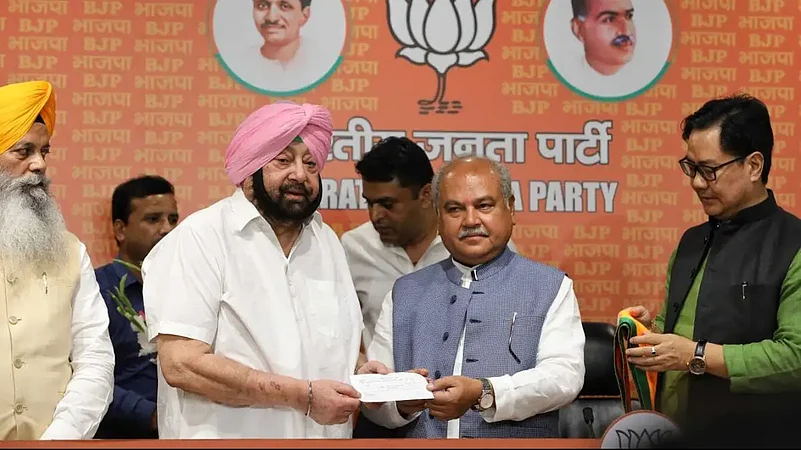Former Punjab Chief Minister Captain Amarinder Singh joined the Bharatiya Janata Party (BJP) on Monday.
Singh also merged his party Punjab Lok Congress (PLC) that he had formed after resigning from the Congress last year.
Singh had entered into a pre-elections alliance with the BJP but his PLC failed to win any seat. He also lost his home turf of Patiala Urban.
The political reversals in the 2022 Punjab assembly elections, preceded by the humiliation by his own party at the time, is a stark reversal of fortunes for a leader who had taken the Congress to power twice in Punjab and was its tallest leader.
Here we explain Singh's political journey, the tussle with the Congress party that made him leave, and what the BJP aims with taking him on board.
Amarinder Singh — From Captain to Chief Minister
Amarinder Singh was born on 11 March 1942 to Yadavindra Singh and Mohinder Kaur into the princely state of Patiala in British India.
Singh joined the Indian Army in 1963 and served for three years till 1966. He served through the 1965 India-Pakistan War.
Singh formally joined the Congress party in 1980 but resigned in 1984 in opposition to the Operation Blue Star — the military operation at Golden Temple, Amritsar to flush out Khalistani terrorists and find and neutralise Jarnail Singh Bhindranwale. He joined the Shiromani Akali Dal (SAD).
In 1985, Singh was elected to Punjab assembly from Talwandi Sabo seat and was made a minister in the state cabinet. However, he resigned seven months later after the then-Chief Minister Surjit Singh Barnala ordered the police to enter Darbar Sahib. This earned him the respect of Sikhs. Singh then went on to found a splinter group SAD-Panthik, which he merged with the Congress in 1998.
In 1999, Singh was appointed the Punjab Congress chief and he worked to create the groundwork for the party's victory in 2002 assembly elections.
In 2002, Singh became Chief Minister of Punjab. After losing to SAD-BJP coaliton in 2007, he brought Congress back to power in 2017.
Singh's stand on Punjab's water issues made him popular. The Economic Times noted, "he Punjab Termination of Agreements Act in 2004 was a high point in Singh's career. It nullified all the agreements with other states and the Centre on the sharing of river waters, having interstate consequences. Captain became a 'saviour of Punjab waters' in the party’s eyes, despite SAD's claims of having championed the cause."
Second CM tenure, road to downfall
Amarinder Singh braved the Narendra Modi wave elsewhere in the country and returned to power in Punjab in 2017.
While Singh was navigating politics in the Congress for the past two decades, another politician was working parallelly all through these years who would have a key role in Singh's eventual fate in the party — Navjot Singh Sidhu.
Sidhu had resigned from the Bharatiya Janata Party (BJP) in 2016 and had joined the Congress. He was made a minister in Singh's cabinet but differences soon emerged between thet two.
While Sidhu was the chief minister and had defeated the SAD-BJP government in the state, he was well past his popularity peak. Moreover, he was alleged to be inaccessible and it was frequently said at the time that he worked and lived more in his farmhouse than in his office and official chief minister's residence.
This was also the time factionalism grew in Punjab Congress. While Sidhu resigned as a minister, a large group of MLAs remained in his camp and Singh found himself isolated.
This was futher worsened by the public fight between Sidhu and Singh. This not just worked against Singh as he was already getting politically isolated, this also went against the larger Congress party in Paunjab as this was the time when Aam Aadmi Party made inroads into the state. Rather than checking AAP inroads, Sidhu and Singh kept fighting. Eventually, Singh resigned as the chief minsiter.
Amarinder Singh's embrace of BJP
Prior to formally joining the BJP, Singh founded the Punjab Lok Congress (PLC) and entered into a pre-poll alliance with the BJP for 2022 assembly elections.
Singh lost his home turf of Patiala Urban in the AAP's sweeping victory and his party lost on all seats.
The embrace of BJP was not just a result of political opportunism or embracing the enemy of the enemy — as the Gandhis-led Congress was his new found enemy. He found common ground with BJP on issues such as national security and border management.
Singh, a national security hawk, has been a vocal critic of Pakistan, which is in stark contrast to his bete noire Sidhu who has shown affection for former Pakistani Prime Minister Imran Khan and was photographed unabashedly hugging Pakistani Army Chief Qamar Javed Bajwa. Singh has also been vocal on the issue of Khalistan and Sikh extremism abroad which seeks to destablise Punjab and India.
These positions of Singh fall in line with the mascular Narendra Modi government. Moreover, Singh enjoys a rapport with Modi.
However, Singh had diverged with the BJP on the issue of farm laws. After Modi government repealed farm laws, this point of divergence was also removed.
However, Singh has differed from the BJP on several issues, such as the water-sharing with Haryana and the scrapping of the special status of Jammu and Kashmir. It is left to be seen what role Singh plays in the BJP and whether he focusses on common grounds or the divergences.
What BJP seeks in Amarinder Singh
The BJP lacks a prominent Sikh face in the party and Singh is likely to fulfil that role.
The BJP is trying to carve out its own space in Punjab ever since SAD parted ways with the saffron party over the now-repealed farm laws.
Moreover, while the BJP seeks a Sikh face, it also seeks a face that's acceptable among its Hindu electorate.
Singh fits these profiles even if age is not on his side. He is a Sikh and, as a longtime staunch opponent of Khalistanis and their sympathisers, he is also likely to be accepted by the BJP's Hindu electorate.


























